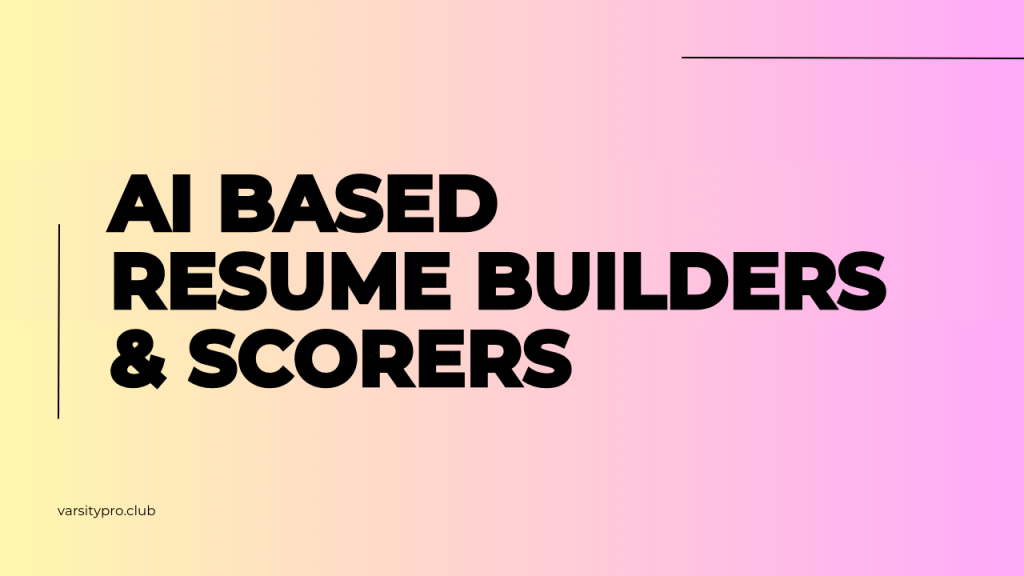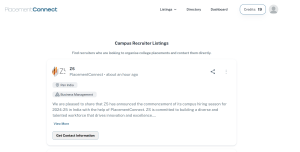Introduction
The Training and Placement Officers (TPOs) play a crucial role in securing career opportunities for students by connecting with companies for campus placement. In today’s competitive job market, the importance of strong connections with recruiters cannot be overstated. Campus placements not only shape the careers of individual students but also enhance the reputation and attractiveness of educational institutions. As TPOs, your ability to forge these crucial relationships can make a world of difference.
Why Reaching Out to Recruiters is Crucial
Building strong relationships with recruiters offers numerous benefits, including:
- Enhanced Placement Records: Strong recruiter relationships lead to more placement opportunities, improving the institution’s track record.
- Diverse Career Opportunities: Access to a broad network of recruiters ensures students have a variety of career paths to choose from.
- Reputation Building: Successful placements enhance the institution’s reputation, attracting more students and better partnerships in the future.
Ways To Connect With Companies for Campus Placement
-
PlacementConnect
-
LinkedIn Networking
-
Career Fairs and Job Expos
-
Direct Outreach
-
Professional Associations and Alumni Networks
-
Online Job Portals
-
Utilizing Social Media Platforms
-
Industry Conferences and Seminars
-
Collaboration with Recruitment Agencies
1. Placement Connect
Placement Connect is a comprehensive platform designed to streamline the connection process between college TPOs and recruiters. It offers a range of services that facilitate easy and direct communication among recruiters and college TPOs.
-
-
-
How to Use:
- Free Sign-Up: Register at no cost, access a comprehensive range of resources.
- Directory Access: Gain immediate access to a verified recruiter directory, including contact details and company insights.
- University Listings: List your university for campus recruitment, allowing recruiters to connect directly.
- Job Postings: View and apply for campus recruitment opportunities posted by companies.
- WhatsApp Community: Stay updated with daily new opportunities in a dedicated WhatsApp group.
Are you a TPO? You might want to join our WhatsApp community for updates on companies looking forward to connecting with you!
Click here to join now!
-
Benefits:
- Streamlined Process: Eliminates the need for time-consuming and tiresome manual research for the contact details of recruiters.
- Verified Contacts: Ensures the authenticity of recruiter information.
- Increased Visibility: Enhances the university’s profile among potential recruiters.
- Real-time Updates: Keeps TPOs informed about the latest opportunities.
-
Disadvantages:
- Initial Setup Effort: Requires some time to get accustomed to the platform.
- Limited Credits in Free Version: The free version offers limited credits to users. Universities can choose to subscribe to a vast host of services offered by VarsityPro and get unlimited access to PlacementConnect.
-
-
Learn: How To Use PlacementConnect To Connect With Recruiters!
2. LinkedIn Networking
LinkedIn is a powerful tool for professional networking, allowing TPOs to connect with recruiters from various industries. It provides a platform to build and maintain professional relationships.
-
-
How to Use:
- Professional Profile: Craft a robust LinkedIn profile showcasing institution strengths and placements.
- Networking: Join relevant groups, engage with posts, and share industry insights.
- Connection Requests: Personalize invites to recruiters and HR professionals, highlighting mutual interests.
- Content Sharing: Share updates on placements and events to keep your network informed and engaged.
-
Benefits:
- Wide Network: Access to a global network of professionals.
- Direct Communication: Enables direct messages and interactions with recruiters.
- Professional Presence: Enhances the institution’s online presence and reputation.
-
Disadvantages:
- Time-Consuming: Requires continuous engagement and monitoring.
- Uncertain Response: Not all connection requests or messages may receive replies.
- Uncertain Reach: Offerings posted by college TPOs might not get enough views and interactions on LinkedIn, leading to a waste of time.
- Potential for Overlooked Messages: A high volume of posts over the platform can lead to important communications being missed.
-
3. Career Fairs and Job Expos
Participating in career fairs and job expos provides an opportunity for face-to-face interaction with companies for campus placement. These events are organized at local, regional, and national levels and attract a diverse range of employers.
-
-
How to Use:
- Event Registration: Identify relevant career fairs and job expos. Register early to secure participation.
- Preparation: Create appealing materials like brochures and student profiles.
- Engagement: Discuss programs and achievements with recruiters. Collect contacts for follow-up.
- Workshops and Seminars: Join or host sessions to network and highlight student success.
-
Benefits:
- Immediate Interaction: Direct, personal engagement with recruiters.
- Feedback and Networking: Opportunity to receive immediate feedback and expand your network.
- Showcase Institution: Provides a platform to showcase the institution’s strengths and capabilities.
-
Disadvantages:
- Resource-Intensive: Requires significant time, money, and effort to participate.
- Limited Reach: Opportunities are restricted to the duration and location of the event.
- Competition: High competition among institutions to attract recruiter attention.
-
4. Direct Outreach
Directly contacting recruiters and companies for campus placement can establish personalized and long-term relationships. This method involves proactive research and targeted communication.
-
-
How to Use:
- Research: Identify companies aligned with your institution’s programs using online resources and industry reports.
- Contact Information: Obtain contact details of HR managers and recruitment heads via company websites and LinkedIn.
- Personalized Communication: Send tailored emails or calls highlighting your institution’s strengths and student achievements.
-
Benefits:
- Personalized Approach: Tailored communication can build strong relationships.
- Long-term Partnerships: Potential for sustained collaborations.
- Direct Communication: Eliminates intermediaries and facilitates direct dialogue.
-
Disadvantages:
- Highly Time-Consuming: Involves significant effort in research and follow-up.
- Low Response Rates: Many cold outreaches may go unanswered.
- Rejection Risk: Higher chance of facing rejection or disinterest from companies for campus placement.
-
5. Professional Associations and Alumni Networks
Utilizing professional associations and alumni networks can provide valuable connections with industry leaders. These networks are often more receptive and willing to assist.
-
-
How to Use:
- Association Membership: Join relevant professional associations. Attend meetings and conferences to connect with industry professionals.
- Alumni Engagement: Host alumni meet-ups, webinars, and networking events to strengthen institutional ties.
-
Benefits:
- Pre-established Connections: It is easier to establish trust and rapport.
- High Level of Trust: Alumni are more likely to assist their alma mater.
- Diverse Opportunities: Access to a wide range of industries and job roles.
-
Disadvantages:
- Limited Reach: Connections may be limited to certain industries or regions.
- Requires Active Engagement: Continuous effort is needed to maintain relationships.
- Dependence on Alumni Willingness: Success depends on the alumni’s willingness and ability to help.
-
6. Online Job Portals
Utilizing online job portals can help TPOs connect with recruiters looking for fresh talent. These portals are widely used by companies to post job openings and search for candidates.
-
-
How to Use:
- Registration: Join job portals like Naukri and Indeed. Highlight key programs and student achievements in your institution’s profile.
- Job Postings: Advertise campus placements with detailed job descriptions, eligibility criteria, and contact details.
- Application Review: Review applications regularly. Shortlist candidates and initiate contact with recruiters.
-
Benefits:
- Broad Reach: Access to a wide range of recruiters and job postings.
- Easy Management: Simple to manage and track applications.
- Efficient Communication: Facilitates direct communication with recruiters.
-
Disadvantages:
- High Competition: Many institutions use these platforms, making it competitive to stand out.
- Generic Interactions: Lacks the personalized touch of direct communication.
- Subscription Costs: Some portals may require a subscription fee for premium features.
-
7. Utilizing Social Media Platforms
Social media platforms like Facebook, X (formerly Twitter), and Instagram can be powerful tools for connecting with recruiters. These platforms allow for real-time communication and engagement with a wide audience.
-
-
How to Use:
- Professional Profiles: Establish and manage institutional profiles on social media. Highlight achievements and upcoming events.
- Content Sharing: Regularly post student successes, placement drives, and industry updates with engaging visuals.
- Engagement: Interact with recruiters through comments, shares, and discussions. Use hashtags to boost visibility.
- Targeted Ads: Utilize social media tools for targeted ad campaigns aimed at recruiters and specific industries.
-
Benefits:
- Broad Reach: Access to a vast audience across various industries.
- Real-Time Interaction: Immediate communication and engagement with recruiters.
- Cost-Effective: Most social media activities are free, with optional paid advertising.
-
Disadvantages:
- High Maintenance: Requires continuous content creation and engagement.
- Informal Tone: Social media interactions can sometimes lack the formality of professional networking.
- Potential for Negative Feedback: Public platforms can expose the institution to negative comments or feedback.
-
8. Industry Conferences and Seminars
Attending industry conferences and seminars can provide TPOs with valuable networking opportunities and insights into the latest industry trends. These events bring together professionals from various sectors, offering a chance to establish meaningful connections.
-
-
How to Use:
- Event Selection: Choose conferences and seminars aligned with academic programs and career interests.
- Active Participation: Attend sessions, panels, and networking breaks with prepared questions.
- Exhibit Booths: Set up a booth showcasing the institution’s strengths if budget allows.
- Follow-Up: Send personalized follow-up emails or LinkedIn messages to contacts made at the event.
-
Benefits:
- Industry Insights: Gain knowledge about the latest industry trends and recruitment practices.
- Targeted Networking: Meet professionals who are specifically interested in recruitment and talent acquisition.
- Visibility: Increase the institution’s visibility among industry leaders.
-
Disadvantages:
- Cost-Intensive: Registration fees, travel, and accommodation costs can be high.
- Time-Consuming: Requires significant time to attend and participate in events.
- Follow-Up Effort: Maintaining connections post-event requires diligent follow-up.
-
9. Collaboration with Recruitment Agencies
Partnering with recruitment agencies can enhance the institution’s ability to connect with a wide range of companies for campus placement. These agencies have established relationships with recruiters and can facilitate introductions and placement opportunities.
-
-
How to Use:
- Agency Selection: Identify reputable recruitment agencies specializing in campus placements with a strong client network.
- Formal Agreements: Establish agreements outlining services, expectations, and terms.
- Information Sharing: Provide detailed information about the institution, programs, and student profiles.
- Regular Updates: Communicate regularly to stay updated on opportunities and industry trends, and share feedback.
-
Benefits:
- Expertise: Leverage the agency’s expertise in recruitment and talent acquisition.
- Wide Network: Access a broad network of companies and job openings.
- Reduced Workload: Agencies handle much of the outreach and coordination, reducing the TPO’s workload.
-
Disadvantages:
- Service Fees: Agencies may charge fees for their services.
- Dependence on Agency: Success is partly dependent on the agency’s performance.
- Potential Mismatches: Risk of job opportunities not aligning perfectly with student profiles.
-
Conclusion
Connecting with recruiters for campus placements is crucial for ensuring students’ successful transition from education to employment. By utilizing a combination of these methods, college TPOs can enhance their outreach efforts and build strong, lasting relationships with recruiters. Among these methods, Placement Connect stands out for its comprehensive and streamlined approach, offering a one-stop solution for all campus recruitment needs. However, integrating multiple strategies will provide the best results, ensuring that no opportunity is missed in securing the best placements for students.
Check Out VarsityPro!








